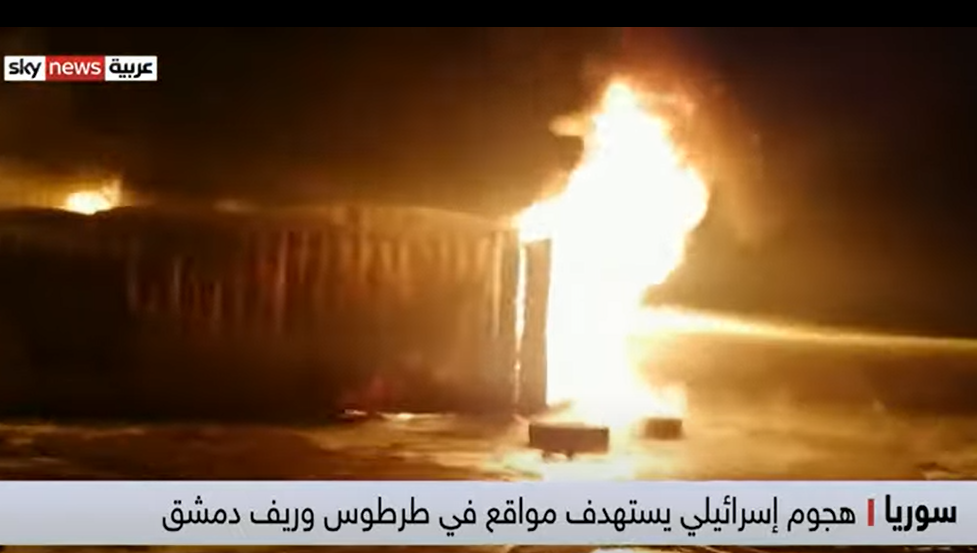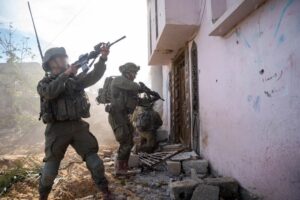At the end of last week, Israel attacked Iranian and Hezbollah targets in the Tartus area in western Syria and the Center for Scientific Research in the Damascus area.
According to various sources, the Israeli attack was carried out from Lebanon's airspace and two people were injured as a result.
The Saudi Al-Arabiya channel reported on August 27 that the Israeli attack was directed against sites for the development and production of precision missiles under Iranian supervision and against missile research and development centers.
Some of the sites are underground. The channel claimed that these attacks will continue if Iran continues to build underground production sites for missiles.
The Syrian Observatory for Human Rights claimed that 1,000 medium-range Iranian missiles were destroyed in the Israeli attack.
There is no confirmation of this from any other source.
A week before, Israel attacked Iranian targets in the Tartus area and in the attack, 3 Syrian soldiers were killed and 3 more were wounded.
According to security sources, Iran recently moved the activity of smuggling weapons to Syria from the Ladakhia region to the Tartus region near the Russian naval base on the assumption that Israel would fear attacking targets in this region which is under Russian control so as not to get into trouble with Russia.
Israel's latest attack in the Tarsus area came two days after harsh words were said by Russian Foreign Minister Sergei Lavrov in the presence of Syrian Foreign Minister Faysal al-Miqdad.
Lavrov said that he firmly condemns the "dangerous practice" of Israel to attacks targets in Syria from time to time.
Usually Russia ignores these attacks and Foreign Minister Lavrov's condemnation is an unusual act.
Lavrov and Syrian Foreign Minister Mikdad added that "we demand that Israel respect the UN Security Council resolution and above all to respect the sovereignty and territorial integrity of Syria".
Security sources in Israel say that Iranian activity in the Tartus area has increased in the Syrian coastal area that is under Russian influence, but despite the condemnation of Russian Foreign Minister Sergei Lavrov, the military coordination between Israel and Russia has not been damaged as a result of Russia's military invasion of Ukraine.
The Israeli attack two weeks ago was on Iranian targets that are about 8 km from the Russian naval base, which is the largest naval base of the Russian military in the Middle East.
Since the beginning of the year, there have been 20 attacks by the Israeli Air Force on Iranian and Hezbollah targets in Syria, most of them in the Damascus area.
Iran and Hezbollah recently began using warehouses and containers of weapons in the Tartus area near the Syrian-Lebanon border for the purpose of storing the weapons that arrive by sea from Iran through the port of Tartus.
The Iranian assumption that Israel would not attack warehouses close to the Russian army base in Tartus turned out to be incorrect, Israel carries out very precise attacks and is careful not to harm Russia's interests in Syria in any way.
Israel strictly maintains the security understandings reached in the middle of 2019, between itself and Russia and the US In the meeting held in Jerusalem between the representatives of Israel and the representatives of Russia and the USA.
These understandings determined that Israel has the right to self-defense against the activities of the Iranian militias in Syria.
The Russians are also careful to keep these understandings, the Kremlin is angry with the Israeli government because of its position on the issue of Russia's military invasion of Ukraine, it is using the issue of the activities of the Jewish Agency in Russia to put pressure on Israel and to come to terms with it but, in the meantime, is careful not to change the understandings with Israel on the issue of its military activity in Syria as long as it does not harm Russian interests.
The continuation of the military coordination between Israel and Russia regarding Syria is an important strategic asset that the political echelon in Israel must maintain, it is now becoming more critical because if the nuclear agreement between Iran and the powers is signed, the immediate result of this will be the diversion of hundreds of millions of dollars to the activities of the Quds Force in Syria and Iraq.
The money will come as a result of the lifting of sanctions on Iran and the thawing of Iran's funds that were frozen in banks in the West.
Iran is expected to resume the sale of oil in large volumes and may even lower its price due to the global energy crisis, which will increase its income.
Israel will have to increase its attacks in Syria in order to delay the Iranian military establishment on Syria's border with Israel and the transfer of advanced weapons from Iran, through Syria, to Hezbollah in Lebanon.
The security situation on the northern front is about to become very dangerous and complex.
Yoni Ben Menachem
Senior Middle East Analyst




